
Celebrating the end of the year: Tributes from some of our artists
20/12/2019
After my wonderful friend Sol Gabetta spread the word at the agency about me being at a junction in my professional life, I was approached by Jasper Parrott himself. I was curious about him as he is a legend in the classical music business, but I was also a little afraid. Considering my activity as a difficult mission, I worried he would think of it only as business, which would in my case be risky, if not crazy. But during this conversation, I felt him an extremely open-minded, even poetic and audacious person. He is immensely literate, and when we meet, he always talks about literature, and what is happening in the world, not only culturally but also politically. With his artists, he is like a gardener, taking care of his beloved plants in the ways they need. He never stops me or discourages me. On the contrary, being intrigued by my ideas, he develops the best platforms for them, and we are I think I can say, very happy we found each other. He promised me that he would support me in unusual and experimental explorations, and he has kept his word.

I was about 20 when I first met Jane. She is John Adams’ manager, so I saw a lot of her when I played his Violin Concerto. I was already going in the direction of contemporary music, and she is so well versed in it that it made it all the easier for me, and it has been a heavenly match.
Artists need many different things from agents. We need them to have a mixture of knowledge, empathy and business smarts. We need them to be diligent and professional when we need connections with composers, artists, conductors and administrators, but also to be able to handle it when we’re so exhausted that we can’t make a concert next week.
I started the violin aged 3 and got professional management at 13, so to be playing still with such excitement at my age is amazing. This has to do with the people around me and I give Jane huge credit. By switching to contemporary repertoire, I was able to reinvent a career for myself and make it my own. It helped that Jane was there to help me along the contemporary music path to reinvent my life. She was also my manager when I went through my second and third pregnancies and needed understanding on a more human level. She was the first to understand the need to be flexible as a manager.
The joy of being able to play music is so important to me, especially when I look around the world and see what’s going on – so much chaos, sadness and politics. There are so many things that aren’t as pure as playing music and being creative, so playing is such a privilege.
I’m very grateful to have had such wonderful years with HarrisonParrott, with Jane, and seeing Jasper a couple of times a year. I’m grateful to the whole organisation and all the wonderful people I work with there.

The HP team manages many singers and must call them every day to sort out dates, schedules and fees, but whenever I receive a call, I don’t know they have spoken to all the others. It feels as if they are working exclusively for me. Singers don’t like to feel that we are one of many, so we like it if an artist manager is an artist themselves in making us believe we are their one and only.
In other situations, such as with record companies, there’s a hierarchy of artists, but with HP I’ve never felt that I’m sharing Ian Stone’s attention, focus and dedication. That’s a huge achievement and a great performance by him and the entire vocal division. There is so much concentration on each individual artist that no one feels as if they are a wheel in the machine, and if there’s an urgent matter somebody takes care of it instantly. I’ve always been very happy with our collaboration.
I’ve known Ian for more than 21 years. We talk often on the phone, he comes to concerts and we are very friendly, but we are not best buddies. We’ve struck the right balance between friendship and business relationship, and that’s important.
We quickly realised that we both wanted a long-term relationship and that it was in the interests of both of us that I sing for as long as I can. I’m now 51 and feel I can perform on the same level I did 20 years ago – in certain things maybe even better because I have more experience. But I need to take into consideration the regeneration periods, which need to be longer. At a recent concert, for example, it was 33 degrees and humid, and the day after, I felt more exhausted than I would have done when I was 30 years old.
An agent needs to be aware of these changing circumstances between the ages of 30 and 50, take them into consideration and adapt the strategy, extending the rest period after an overseas trip or after a summer concert. We’ve done that, which is why at 51 I feel vocally fit and still enjoy singing. There have been times when it was more difficult, for personal reasons, but I never felt any burnout.
One of the reasons for this is that Ian and Catherine haven’t tried to maximise their profit. Fortunately, I still have more offers than I can accept, and from an agent’s standpoint, it would be tempting to accept them all, but Ian will tell me, ‘There was an offer right after you come back from China and I declined.’ We always plan time for recuperation after overseas trips or long periods of opera productions.
It’s more than getting the best fee out of a concert, booking as many concerts as possible and creating PR. It’s about developing a strategy for each individual artist and working out appropriate repertoire and concerts that will enable me still to be singing at 65. Maybe I won’t sing Giulio Cesare any more but I will be able to do lute recitals. An agent must have this in mind and with Ian I have no doubts – the proof is how far I’ve come and that I still sing and still enjoy singing.
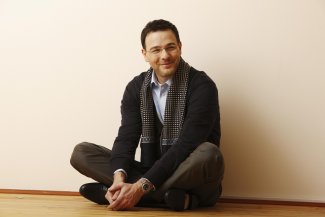
It’s important for a musician to feel completely cared for and trusted, and that’s how I feel about Lydia Connolly and Tracy Lees, my team at HP. It goes beyond career support and the artist-manager relationship. Every musician has self-doubt at some point – I only have to drop the team an email and they call me to talk about whatever troubles me, whether it’s about music or not.
I’ve never been particularly career-driven or strategic. I don’t need to be playing only with the biggest orchestras – my plan has only ever been to be truthful to myself, to play as well as I can while making a living. Lydia and the team have always taken care of my needs and I’m happy with what they’ve achieved.
They are also very supportive when I come up with projects. For example, they invested a lot of time in a recent project I did with my wife, which mixed dance, literature and music, even though it was hard to describe, and it was clear there wasn’t a huge amount of money to earn. Making money isn’t their main incentive whatsoever: if I want to play somewhere but the fee isn’t great, they never deny me. Smaller venues or orchestras often can’t afford full fees, which are paid, especially in Germany, by the tax payer, so if well-known artists only go to bigger venues, smaller communities wouldn’t get to hear them and that’s not fair. The team lets me do that and it hasn’t harmed me.

After competing in BBC Young Musician in 2017 I was with YCAT on the BBC scheme, looking for an agency. I heard from Lydia and went in to meet everyone at HarrisonParrott. They all seemed to have a genuine passion, and it felt like the perfect fit. The company is about providing the best support for musicians as well as developing the best career possible. I feel very lucky with Lydia, Ed and Val, who care that I do things that I enjoy and have a fulfilling career, rather than just a busy one.
An artist needs a manager who is willing to say no and – for me – someone who is conscious of the fact that I’m in the early stages of my career. I’m at a nurturing stage at this point and I need a manager who can help me to balance working out the best time do things, taking up amazing offers and developing as a musician. Ed and I regularly discuss the years to come, my ambitions and aspects of my career I’d like to develop. I feel very well looked after, and it was apparent I would feel that way from the beginning.

I’ve been with HarrisonParrott for 25 years or so. I began with Linda Marks and I’ve worked with many different people over the years. It’s not just about the person who’s overlooking things, though – it’s about everyone else working for you, the assistants and people doing travel, and I have always had the most wonderful team.
The success of a manager is not measurable in the way it would be with a banker. It is about psychology, experience, contacts and the personal touch. You need to be able to read each other. There’s frustration in all walks of life and certainly when you’re constantly travelling around the world. There are tough days and wonderful days. A manager has to know the psychology of when to push you or pull you back; when to have a no-nonsense or a sympathetic approach. They must know when a crisis is really a crisis and when it’s just a bad breakfast that will be forgotten in a couple of hours. They need to know how to calm someone down in difficult situations. This often happens with orchestral rehearsals (which can be full of anxiety), when meeting a conductor for the first time, dealing with difficult pianos or bad hotels.
No artist is ever loved the same way everywhere, and it’s important for a manager to know when an orchestra or conductor doesn’t like an artist, so they don’t keep calling every week for dates. It’s like this for every artist, but we all have fragile egos and managers have to be careful. If I’m told a date doesn’t work, I read between the lines; but things change, and sometimes conductors with whom one hasn’t worked want to book you. That all goes on behind the scenes, and perhaps best not to know!
It isn’t just about selling a diary – it’s a human relationship. A manager has to protect the mental health of their artists. It’s good to be busy, but bad to be too busy. Sometimes when we’re on a high we accept more than we should. It’s important for managers to keep that in mind. They have to say, ‘Today you don’t mind playing in Tokyo one night, Sydney the next and then Vienna and Helsinki, but when it comes to that week you will regret it.’
In some situations, if you’re not earning money, you’re of no use and it’s ‘Goodbye!’ I’ve never felt that I was just an object for HarrisonParrott, a means of making money. It’s about the relationship between a musician and business, when to push and when not to, and how to keep artists’ lives free from unnecessary pressures. There’s always a human element.

Before I started working with HarrisonParrott I never considered my career strategically. I was interested in how to shape a phrase; what type of colours, sounds, dynamics, and rhythms the music needs; how to share my energy with an audience and project what I believe. Tugce and Jasper see how to complete this way of thinking and I’ve learnt how strategic thinking supports my musical development.
As a soloist, I depend on my partners – orchestras and conductors. Working with the right people supports my creative growth. It’s only been half a year, but I feel that they are interested in how I see things, how I am, what I need, what I need to become even better, and how to open doors and go on stages that are inspiring for me.
The stability and organisation of working with HarrisonParrott mean that I can finally focus on smaller programmes and on places where it can have emotional impact on the audience. I have the time to prepare music, rather than delivering it as a product.

Jasper and I have known each other for 35 years, and recently we met to explore a particular collaboration. After a massive brainstorming session that included rabid philosophising and the giddy sharing of ideas, Jasper paused for a moment and then slowly and honestly cautioned: ‘Kent, you may want to consider the fact that there are many people in the business who really don’t like me.’ After a second or two of silence, we both broke out in laughter, because ‘it takes one to know one’.
Anyone who is truly an original – a visionary who can sense the future before it arrives – must deal with the reality that most people will have a problem with that. Many feel uneasy with that which does not conform, and which is not tied to actuality, but reflects an imagination beyond time and fashion.
These are the exceptional qualities that Jasper instils in HP and which the company shares passionately with colleagues and public alike. To risk believing in the content which art-music intrinsically carries requires the courage to imagine and the commitment to lead.
It is clear that HarrisonParrott has not only survived when others have failed, but it has also remained relevant and is perhaps more so now than ever before. Its faith and commitment to the fundamentals of classical music – creativity, originality, purity, uncompromised quality and that which flies universally above time – have honoured the values and the beauty of the arts.
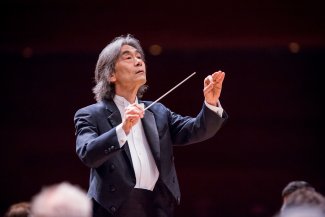
I had been timpanist of the London Philharmonic Orchestra for four years when I was appointed as Assistant Conductor with the BBC Scottish Symphony Orchestra. I’d been there for about a year when to my surprise I got a letter from Jasper Parrott, saying he’d heard interesting things about me and wanted to meet. He and Terry were working for Ibbs & Tillett, and we had an informal conversation.
In the end I got a call from Terry saying that they’d left Ibbs & Tillett to set up on their own and would I come in with them. I became one of the original twelve HarrisonParrott artists. I’d only been a conductor for a year, and I was the only artist of the twelve that I’d never heard of! I was extremely fortunate. They had great faith in me and thought they could make things happen. Jasper made a colossal difference in getting my career started, almost single-handedly. He went to orchestras and enthused about me, working tirelessly on my behalf in those crucial first years.
They had a small office on Wigmore Street, with a room each and a skeleton staff. I could phone Jasper any time I liked and would go in and see them. I became Chief Conductor of BBC Scottish Symphony Orchestra and then Northern Sinfonia, which I did simultaneously for a time, and things snowballed from that. The number of HP artists grew quickly, so Jasper was in charge of me but had people working for him who did the routine management.
I’ve been looked after well however big the company has been, which is a tribute to the organisation. Whenever anyone phones, the first question they ask is how I am, without exception, which is wonderful, and whenever I have a concert, they call the next day to see how it went. Whoever looks after you is hands on, which is the HP ethos – it’s always had the personal touch. Whenever you go into the office, you get a royal welcome and feel you are part of a family.
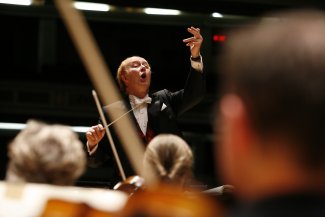
I don’t think my life would have been close to this without Lydia by my side, with her sensitivity, support, positive attitude, vision, diplomacy, loyalty and friendship. We have gone through so many things in the past 20 years: recordings, changes of plans, debuts, great projects, pregnancies, balancing young kids and work, teens, exhaustion and creative talk. She has always been able to find solutions without hurting anyone – always full of patience and ideas.
I was always amazed to see how Lydia and her colleagues worked for Lisa Batiashvili, so I wanted to be part of the family at HP and that eventually became a reality. I’ve had inspiring advice from Lydia about how to develop my conducting career and working with her and her team has always been a treat. Music is a massive, strong machine and you need to appreciate each cog in order to develop the best projects. I am afraid to see classical music descending into a glamorous gala or an Instagram product – I believe there should be no compromise in the quality and honesty of interpretation. HP stands for that, too, which is a huge relief for me as an artist, and a guarantee of quality for society.
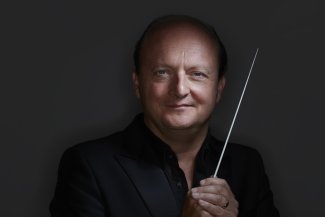
It is hard to believe that I have worked with Lydia at HP for 20 years. When I signed with them, I was working as Conductor of the BBC Scottish Symphony Orchestra and little did I know that I had hit the jackpot in terms of management. Lydia and her team have taken incredible care of me over the years. I can trust them to give thoughtful and meaningful opinions and advice, and they are always kind and understanding when I neglect my emails and don’t respond to them for weeks at a time.
Lydia is one of the few people I trust to give me her honest opinion, even when it doesn’t align with my own. She was invaluable during the Minnesota Orchestra’s lockout several years ago, and I owe her a lot for that. I truly believe that if it hadn’t been for HP, I would not have been offered my current job with the Minnesota Orchestra, which has been one of the most meaningful collaborations of my career.
I would like to wish HarrisonParrott a very happy 50th Birthday. I am very happy to have been with you from the very beginning, and all of you I have worked with have been wonderful. I consider you to be my good friends. Cheers, and my very best wishes.
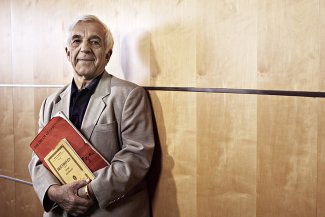
Jasper is an inspiration and it has been a great privilege to have been part of this amazing company for more than 20 years: and as he often says, ‘We are just getting started!’ Heartfelt thanks for your dedication and vision and congratulations to the whole team!
What makes HP so special is the people, they’re brilliant and imaginative, but they’re also nice and that doesn’t necessarily come with the territory of arts management. A lot of agents come and go but HP has continued to flourish – there’s no place on the planet where there isn’t an HP artist performing somewhere some time. It’s been a huge honour for me. I know it’s not simple dealing with someone who’s not only a performer but a composer, who has to be managed between his extroverted public life and his introverted private creative life, but I can’t think of anyone who has done it better.
When I first met Lydia, in 2015, I was immediately captivated. It was as if she had the key to understanding my life as a musician, husband and father. Since the first day we worked together, the team has been my guardian angel – protecting, guiding, advising and helping me, and even shouting at me (but not too much!). It is the best team, and I feel privileged and honoured to be working together.



